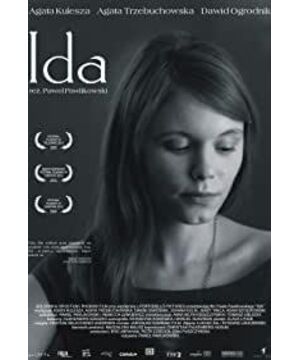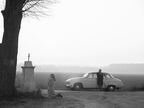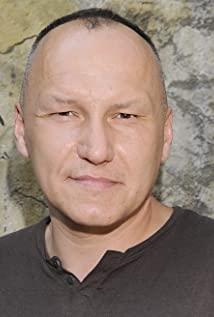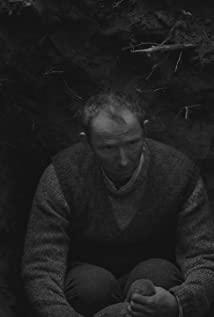The film was shot in black and white, which seems to be a popular color in the film industry recently, but it is used in this film to reflect the dull and dark era, but it contrasts with it.
The story in the movie took place in 1962. It was a period when the Cold War was in full swing, and it was also a period when Eastern European socialism entered a relatively stable and dull period. For Poland, after the Poznan incident, Gomulka came back to power, and he implemented limited reforms in Poland. Compared with the previous period, the Polish atmosphere at this time is more free and relaxed, gently blowing and relaxing. wind.
The protagonist in the film, Ada, is an orphan. She grew up in a monastery. When she was about to swear to become a nun, she embarked on the road of seeking the mystery of her own life in order to seek the consent of her only relatives and aunt. The film follows in Ada's footsteps, uncovering a sad history, but also showing the reality of Polish society at that time.
The Catholic Church is a topic that cannot be circumvented in Polish history. It has played an extremely critical role in all critical periods of Polish history. Poland is one of the few Eastern European countries that believes in Catholicism, and its level of piety also exceeds that of other countries. The church has become the spiritual pillar of the Polish people, and of course it also governs their actions. Even in the decades of communist rule, the Catholic Church is still deeply rooted among the people, which is extremely rare in socialist countries. Communism regards religion as its natural enemy. The churches in other countries in Eastern Europe were either completely banned or suffered heavy blows and were dismembered and transformed into the so-called Three-Self Patriotic Church. In Ukraine, the Catholic Church was also forced to merge with the Orthodox Church, and those who disobeyed were exiled.
Poland has also experienced a dark period when a large number of churches were closed and a large number of clergy were arrested. But after all, the church was preserved, and it also preserved the comfort of the soul and the fire of freedom for the Polish people. The bishop of Poland at the time said: "We don't allow things related to gods to be placed in front of the tyrant's altar. Never!" He was also arrested, but these words inspired the Polish people.
Ada grew up in such a monastery. When she was twenty in 1962 and could swear to become a nun, she might have no doubt about the choice of life that she would serve God in the monastery for a lifetime. She is an orphan, she doesn't know her life experience, she was a child born in troubled times, and she has accepted her destiny. When she heard that she was a Jew and her parents had died at the hands of the Nazis, she was a little surprised. Therefore, she wanted to go to the tomb of her parents before she became a nun and do her best to be a human. Accompanied by her aunt, Ada embarked on the road to find the bones of her parents, also to solve the mystery of her own life experience.
Ada, who had never left the monastery, faced a world she was not familiar with, which was far more complicated than the world in the monastery. What's more painful is that she has to pursue history and face the tragic truth. These truths have been buried, just like the bones of her parents, no one wants to uncover them again except for their relatives. After all, history has too much cruelty and too much unbearable. Poles have the pain of being ravaged by the iron hoof of the Nazis, and they also have the memory of the Katyn tragedy made by the Soviet Red Army, but they have also acted to destroy their conscience when facing the problem of Jews. Fortunately, the film confronts this period of history, at least it can be regarded as some confession.
Everything that Ada had established in the monastery in the first two decades was facing vacillation. She is entangled between family love and religious feelings, she has secular involvement, and hesitates about her future. The fact that she was a Jew and her dedication to Christianity also conflicted in her heart. What's more, how much shock did the history of the tragic death of her parents give her? The murderer who killed her parents also left her lifeblood.
It was her aunt who was more difficult to accept that period of history than her, the woman who was once called the "Red-haired Wanda". She appeared extremely capable and ruthless as soon as she appeared. She was also a Jew, but she had participated in guerrillas, and now she is in a high position as a judge, leading a good life by herself. Her private life is quite chaotic. Even when she accompanied her niece Ada to search for history, she did not forget to have fun in time, which caused Ada, who grew up in the monastery, to look sideways at her. She is also very domineering, but in such a society, how can she help her niece find the bones of her parents without using her power?
At first, Wanda was also indifferent to her niece, Ada, but the process of searching for the remains of the common relatives gave birth to a family relationship between them. For the final truth, Wanda seems more difficult to accept than Ada. She died with her sister and brother-in-law, as well as her son. She knew better than Ida at first, but she has been reluctant to accept this fact in her heart, perhaps hoping for other results. When she heard the murderer talk about the situation in person, holding the bones of her son in her hands, everything she had built in her heart collapsed. Her final decisive action was decisive and simple, without a trace of hesitation, just as she usually did. The piece of music she played, maybe a nostalgia for the past life?
In fact, she should have understood the cruelty in such troubled times and the terrible truth. Since you have the courage to pursue history, you have to accept the cruelty of history. As a judge of an emerging red regime, she holds the power of life and death for many people. According to her statement, she once sent a large number of reactionaries to the execution ground in order to suppress the enemies of the red regime. Therefore, she also got the nickname of the terrifying "Red Wanda". Whether her death was a protest against the atrocities of the Nazis and Poles against the Jews, or a confession of her indiscriminate killings in the past, this is a question that cannot be known.
Ada is far less decisive and decisive than Aunt Wanda, she wanders between the world and God. She had already fallen in love with the secular world, because the identification of her identity would make her find it difficult to survive in the monastery. But her aunt's final decisive action pushed her to the monastery again. Even the first taste of love made her feel the worldly life, but this did not increase her memory of the present world. But when she returned to the monastery, her mentality had completely changed, and she did not swear to become a nun with her companions. As a girl who grew up in a monastery, so pure and ignorant of world affairs, how can one think of so many entanglements in the back of history? She was wounded by the ferocious history, and she had to reposition the coordinates of her life.
History is too cruel, and I might be hurt when I look back.
View more about Ida reviews











